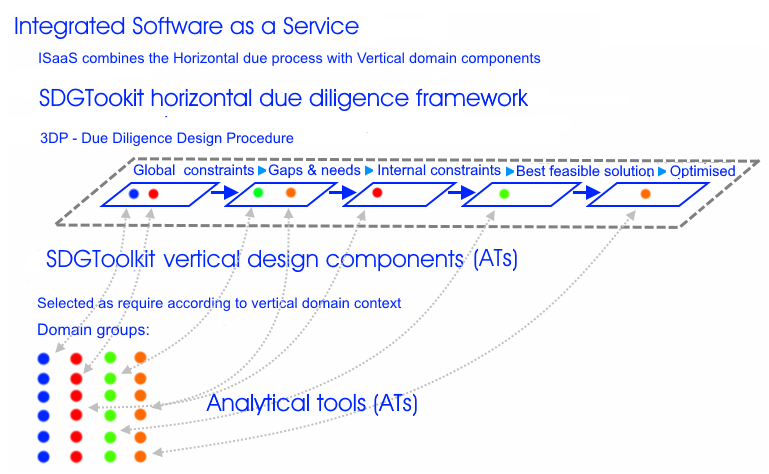20th, April, 2021
ATDC specialises in the creation of analytical tools to asist practitioners in their battle to face the challenges of climate change and sustainability.
In December 2020, as a result of the decade long Decision Analysis Initiative (DAI 2010-2020), the SDGToolkit was designed and implemented. This system is a completely new approach to the design, implementation and evaluation of projects undertaken to support Agenda 2030 Sustainable Development Goals. The driver of the change has been evolving and new recommendations from the OQSI (Open Quality Standards Initiative) dedicated to project cycle and portfolio management quality and effectiveness.
This combines a horizontal due diligence design procedure (3DP) within which the procedures are supported by analytical tools (ATs) providing domain-specific vertical analyses to determine the required information in each procedural step.

Since the 1960s written project cycle guidelines have not been accompanied by appropriate ATs. Without project design teams having access to the approriate tools, design information has remained sparse and fragmented and often assumptions remained unevaluated or tested leading, in many cases, to project failures.
The DAI 2010-2020 identified over 232 potential ATs and SEEL, based on over 30 years experience in the field of decision analysis and digital intelligence systems, has designed and implemented over 80. This work continues as a combination of decision analysis modeling, mathematical logic and digital intelligence (AI) and it requires a degree of specialization in cloud technologies combined with applications domain expertise.
The Analytical Tools Development Centre (ATDC) was established at SEEL in order to maintain the production of ATs for SDGToolkit. We are advancing a leading-edge expertise in their specification and implementation in a constant process of improvement and innovation helping deliver quality ATs to develop practical solutions for Sustainable Development Goals.
1 SEEL has over 30 years experience in applying Systems Engineering Economics. This is a method of identifying solutions to any problems based on the construction of decision analysis models to analyse solution options based on quantitative simulation, sensitivity analyses and optimization techniques according to criteria of quality of information management, resource costs, unit costs, margins, effectiveness, efficiency, resilience and sustainability.
2 SEEL staff and associates have in excess of 50 years experience in the design, management and evaluation of development projects for such organizations as FAO, World Bank, European Commission, DfID, ICO, CBD amongst others and corporations such as Interbras, Cobec, Intercomex, Unilever, Mars, Express and Aquion.